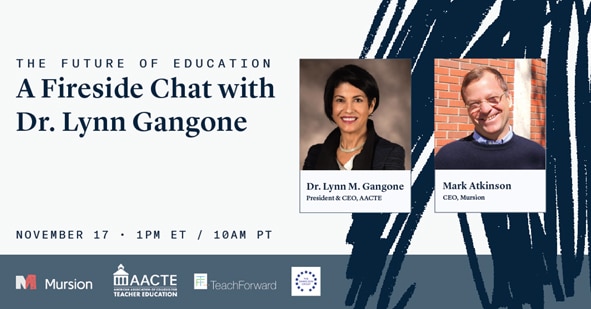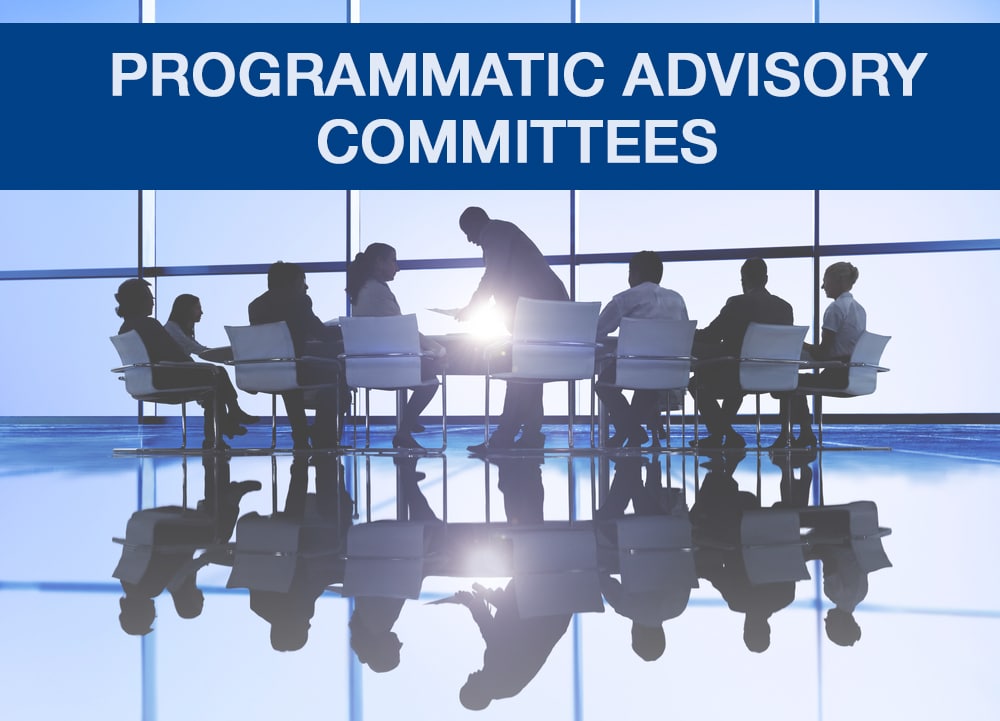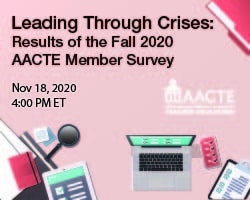17 Nov2020
By Monika Jo
 Please join us Tuesday, November 17, 1:00 p.m. ET for a joint reflection on 2020 and a look forward to the coming year. Mursion Co-founder and CEO, Mark Atkinson will host a fireside chat with AACTE President and CEO Lynn M. Gangone. Join the conversation as they share their perspectives on
Please join us Tuesday, November 17, 1:00 p.m. ET for a joint reflection on 2020 and a look forward to the coming year. Mursion Co-founder and CEO, Mark Atkinson will host a fireside chat with AACTE President and CEO Lynn M. Gangone. Join the conversation as they share their perspectives on
- The current state of teacher prep programs
- What will go back to “normal” vs. what innovations for coping with the pandemic will stay
- Models and systems are on the table for reinvention, writ large, what does this mean for higher education?
Register now for the free event.
The recorded session will be available for viewing.
16 Nov2020
By Jacqueline E. King, Ph.D.

At its September meeting, the AACTE Board of Directors appointed new members to the programmatic advisory committees, including two new committees on Educator Diversity and the Holmes Program. Congratulations to these AACTE members, who will assume these positions on March 1, 2021, and a special thank you to everyone who submitted a nomination for these important volunteer leadership roles.
16 Nov2020
By Jacqueline E. King, Ph.D.
 If there is one thing we can all agree on, 2020 has been a year like no other. To learn how COVID-19 and the racial injustice crisis have impacted educator preparation—and the steps EPPs are taking in response—AACTE conducted a survey this fall of its members. Here are a just a few of the findings:
If there is one thing we can all agree on, 2020 has been a year like no other. To learn how COVID-19 and the racial injustice crisis have impacted educator preparation—and the steps EPPs are taking in response—AACTE conducted a survey this fall of its members. Here are a just a few of the findings:
- More than half of the respondents are using instructional designers to help faculty create online courses, and 75% have made new tools available such as simulations and video libraries.
- Only have of respondents reported that their state had modified or waived performance assessment requirements due to COVID-19.
- 60% of respondents reported declines in undergraduate enrollment.
- 70% of respondents have recently increased their investment in diversity, equity, and inclusion initiatives.
16 Nov2020
By Meghan Grenda
AACTE’s new Member Spotlight features an individual from a member institution, highlighting how their work makes a difference in classrooms across the country. Nominate yourself or another member by providing a response to the following questions and sending to mgrenda@aacte.org.
 Get to know Bethany Hamilton-Jones …
Get to know Bethany Hamilton-Jones …
Current position: Clinical Associate Professor, University of Georgia (UGA)
Number of years in this position: I’ve been in teacher preparation since 2006!
Alma Mater(s): UGA and SUNY Oswego
Hometown: Fairport, NY
16 Nov2020
By Matthew Wales

Applications are now being accepted for the new AACTE Video Observation Technology Implementation Grant. This opportunity, in collaboration with Edthena, is available exclusively to AACTE members.
Given the many challenges that educator preparation programs have weathered in 2020, AACTE and Edthena have created this grant opportunity to provide some much needed relief for up to 20 AACTE members. Each grantee will be awarded up to $25,000 in grant funds, which will be utilized to implement the Edthena platform for the upcoming Spring 2021 semester.
For those AACTE member institutions interested in applying:
- Active AACTE members in good standing, and not already an Edthena partner, are eligible for the grant.
- Matching of grant funds are not required during this Spring 2021 offering.
- Continuing Edthena implementation after the grant period is not required.
- Grantees will receive implementation and planning support from the Edthena team to build a deployment strategy for the spring semester.
- Awardees will receive access to the relevant edTPA toolsets needed for your program (where applicable).
- AACTE team members will also participate in onboarding training with grantees, where possible, to help connect awardees with additional resources.
16 Nov2020
By Jane E. West
This blog post is written by AACTE consultant Jane West and is intended to provide updated information. The views expressed in this post do not necessarily reflect the views of AACTE.
Welcome to the world of President-elect Joe Biden and VP-elect Kamala Harris.
What Might a Biden Presidency Mean for Education?
When President-elect Joe Biden told the nation that educators will have “one of their own” in the White House, a sigh of relief and a whiff of optimism were palpable among the education community. Referring to his wife, Jill Biden—a long time community college professor—he also said that “teaching isn’t just what she does, it’s who she is.” Thus, the president-elect sets the tone for the next four years of one of the most pro-education administrations in our lifetimes.
Biden named his transition teams this week, including the one for education. Led by Linda Darling-Hammond, president of the Learning Policy Institute and former head of the Obama Administration education transition team, the group is comprised of a number of former Obama appointees as well as union leaders. The team is working on compiling both potential nominees for political positions in the Department of Education as well as fleshing out policy priorities and a timeline.
16 Nov2020
By Jacqueline E. King, Ph.D.

Does it seem like elections never end these days? Well, at AACTE democracy is working. AACTE has a convenient online voting system, and it will only take a moment to cast your vote for new leaders of your Association.
The 2020 election for the AACTE Board of Directors is underway through Friday, December 4. Two seats will be decided via online voting:
- One seat represents the Council of Academic Deans from Research Education Institutions (CADREI)
- One seat represents the Teacher Education Council of State Colleges and Universities (TECSCU)
All AACTE All AACTE Institutional and Chief Representatives are eligible to vote for both positions, regardless of whether you work at a CADREI, TECSU, or other type of institution. The slate is as follows:
16 Nov2020
By Meghan Grenda
 AACTE’s new Member Spotlight features an individual from a member institution, highlighting how their work makes a difference in classrooms across the country. The spotlight offers an opportunity for you to share your institution’s initiatives with your colleagues, inspire other institutions to consider membership, and strengthen awareness of educator preparation. View our first Member Spotlight highlighting Bethany Hamilton Jones.
AACTE’s new Member Spotlight features an individual from a member institution, highlighting how their work makes a difference in classrooms across the country. The spotlight offers an opportunity for you to share your institution’s initiatives with your colleagues, inspire other institutions to consider membership, and strengthen awareness of educator preparation. View our first Member Spotlight highlighting Bethany Hamilton Jones.
Share your story with peers, inspire students, and strengthen awareness of the profession and association. Each month we’ll highlight an individual in our EdPrepMatters blog and e-newsletter. Nominate yourself or another member by providing a response to the following questions and sending them to mgrenda@aacte.org.
10 Nov2020
By Katrina Norfleet

In a recent article, “To Tackle Critical Theory in the K–12 Classroom, Start with Colleges of Education,” the author shares the view of someone who opposes training teacher candidates in critical race theory. AACTE Board member John Henning, dean of the School of Education at Monmouth University, refutes these opposing views and explains the value of including CRT work in education preparation programs.
The author of the article states that critical race theory (CRT) “amounts to an unremitting attack on all of America’s norms and traditions.” How would you respond to this statement?
 The purpose of critical race theory is to examine the role of race and racism in society. And it is helpful for raising awareness so that we can identify the existence of structural racism. It is not part of the curriculum; its purpose is not to question American norms and traditions. However, because racism is widely acknowledged to still exist in the United States, it can cause us to reflect both on our past and current practices. But it should be remembered that it is a theory, and, like all theories, it can be accepted partially, mostly, or fully. It is appropriate for teacher preparation programs to discuss this theory as part of their coursework because of the increasing racial diversity in schools. Most teachers are White females (around 80%) and critical race theory provides teachers, whether they are White or another race, with perspectives that allow them to gain insights into their students.
The purpose of critical race theory is to examine the role of race and racism in society. And it is helpful for raising awareness so that we can identify the existence of structural racism. It is not part of the curriculum; its purpose is not to question American norms and traditions. However, because racism is widely acknowledged to still exist in the United States, it can cause us to reflect both on our past and current practices. But it should be remembered that it is a theory, and, like all theories, it can be accepted partially, mostly, or fully. It is appropriate for teacher preparation programs to discuss this theory as part of their coursework because of the increasing racial diversity in schools. Most teachers are White females (around 80%) and critical race theory provides teachers, whether they are White or another race, with perspectives that allow them to gain insights into their students.
10 Nov2020
By Jane E. West
As of July 1, 2020 all universities were required to comply with 2019 federal state authorization regulations. Among the requirements in these complex regulations is one related to all programs that fulfill educational requirements of a profession that requires licensure or certification. Included among these programs are those in schools and colleges of education—for teachers, psychologists, school counselors and more. Every university with such programs is required to make public, for each state, whether the program does or does not meet such requirements. For example, a special education teacher preparation program at a university in Florida must disclose whether its requirements would lead to certification in Minnesota.
MSU determined to provide a university-wide compilation of program requirements in relation to state certification requirements rather than a college by college compilation. Who was involved? What is the utility of doing it this way?
At MSU, compliance with this requirement took a village and included substantial support from university-level offices. First, the General Counsel’s office and Registrar’s office worked with administrators from across campus to develop a plan for compliance with both these regulations and also the similar reporting about online programs required by NC-SARA. This group identified the sequence of necessary work and set out due dates for various pieces. Second, staff from the General Counsel’s office and Registrar’s office met as needed with individuals from colleges, in addition to continuing to meet with the ad hoc group that created the process. In response to a request from colleges, the university also took care of all the relevant notifications to current students, which was a great help.
10 Nov2020
By JTE
This Journal of Teacher Education (JTE) interview features insights on the article entitled, “What Constitutes an ‘Opportunity to Learn’ in Teacher Preparation?” by Julie Cohen and Rebekah Berlin. The article was published in the September/October 2020 issue of the JTE. AACTE members have free access to the articles in the JTE online archives—just log in with your AACTE profile.
What motivated you to pursue this particular research topic?
The goal of the paper was to surface issues around measuring what happens in teacher preparation, in particular, the construct of “opportunity to learn” or OTL. Much of the prior research on OTL has relied on survey data, and scholars have often treated the idea of OTL as an objective reality, contingent on features of coursework or fieldwork made available in a given program. However, self-reports of “opportunities” are often divergent from other measures—like observations—of the same events. Rather than assume that self-reports tell us something conclusive about a particular program, we wanted to use the rich, multifaceted data we had from a longitudinal study of teacher preparation to analyze whether program features and candidate characteristics explain variation in reported OTL.
10 Nov2020
By Jacqueline E. King, Ph.D.

You may have thought that you were done voting for 2020, but there is one more important election this year. The good news is that you don’t have to worry about in-person or mail-in ballots. AACTE has a convenient online voting system, and it will only take a moment to cast your vote for new leaders of your Association.
The 2020 election for the AACTE Board of Directors is underway through Friday, December 4. Two seats will be decided via online voting:
- One seat representing the Council of Academic Deans from Research Education Institutions (CADREI)
- One seat representing the Teacher Education Council of State Colleges and Universities (TECSCU)
All AACTE Institutional and Chief Representatives are eligible to vote for both positions, regardless of whether you work at a CADREI, TECSU, or other type of institution. The slate is as follows:
09 Nov2020
By Jacqueline E. King, Ph.D.
 How are education leaders responding to the twin crises of the coronavirus pandemic and racial injustice? What can we learn from each other and how can AACTE best support its members as they navigate these unprecedented times? A webinar on Wednesday, November 18 from 4:00 to 5:00 p.m. ET will feature the results of AACTE’s recent member survey and reactions from leaders in the field of educator preparation.
How are education leaders responding to the twin crises of the coronavirus pandemic and racial injustice? What can we learn from each other and how can AACTE best support its members as they navigate these unprecedented times? A webinar on Wednesday, November 18 from 4:00 to 5:00 p.m. ET will feature the results of AACTE’s recent member survey and reactions from leaders in the field of educator preparation.
09 Nov2020
By Jerrica Thurman

Register today for the AACTE Town Hall on Critical Race Theory on November 19 at 3:00 p.m. -4:00 p.m. EST. Critical Race Theory provides a lens to understand race, racism, oppression, and power in America. Join the AACTE Town Hall on the integral role educator preparation programs play in advancing scholarly work on Critical Race Theory and discuss ways to resist recent federal attacks on institutions’ efforts centered on this work. Bring your voice to the AACTE open forum and share challenges and success stories about your efforts to address race, equity, and social justice during these challenging times.
09 Nov2020
By Jerrica Thurman

AACTE is collaborating with Edthena to provide $500,000 in grant funding to teacher education programs for Spring 2021.
AACTE member institutions may apply by December 7, 2020, to receive up to $25,000 for implementing video observation technology to support their teacher candidates during COVID-19 and beyond. Through this partnership, up to twenty AACTE members will receive grants for the upcoming Spring 2021 academic term.
A leader in video observation and collaboration technology, Edthena is widely used by schools, districts, and teacher education programs across the country. The technology platform enables teacher candidates to upload videos of their practice and faculty to provide feedback at specific moments in time. An approved edTPA platform provider, Edthena’s video technology can be utilized in methods courses, field observations, edTPA skill building, and group learning, making it possible to capture data for candidate growth and program improvement.
 Please join us Tuesday, November 17, 1:00 p.m. ET for a joint reflection on 2020 and a look forward to the coming year. Mursion Co-founder and CEO, Mark Atkinson will host a fireside chat with AACTE President and CEO Lynn M. Gangone. Join the conversation as they share their perspectives on
Please join us Tuesday, November 17, 1:00 p.m. ET for a joint reflection on 2020 and a look forward to the coming year. Mursion Co-founder and CEO, Mark Atkinson will host a fireside chat with AACTE President and CEO Lynn M. Gangone. Join the conversation as they share their perspectives on


 If there is one thing we can all agree on, 2020 has been a year like no other. To learn how COVID-19 and the racial injustice crisis have impacted educator preparation—and the steps EPPs are taking in response—AACTE conducted a survey this fall of its members. Here are a just a few of the findings:
If there is one thing we can all agree on, 2020 has been a year like no other. To learn how COVID-19 and the racial injustice crisis have impacted educator preparation—and the steps EPPs are taking in response—AACTE conducted a survey this fall of its members. Here are a just a few of the findings: Get to know Bethany Hamilton-Jones …
Get to know Bethany Hamilton-Jones …

 AACTE’s new Member Spotlight features an individual from a member institution, highlighting how their work makes a difference in classrooms across the country. The spotlight offers an opportunity for you to share your institution’s initiatives with your colleagues, inspire other institutions to consider membership, and strengthen awareness of educator preparation. View our first Member Spotlight highlighting Bethany Hamilton Jones.
AACTE’s new Member Spotlight features an individual from a member institution, highlighting how their work makes a difference in classrooms across the country. The spotlight offers an opportunity for you to share your institution’s initiatives with your colleagues, inspire other institutions to consider membership, and strengthen awareness of educator preparation. View our first Member Spotlight highlighting Bethany Hamilton Jones.
 The purpose of critical race theory is to examine the role of race and racism in society. And it is helpful for raising awareness so that we can identify the existence of structural racism. It is not part of the curriculum; its purpose is not to question American norms and traditions. However, because racism is widely acknowledged to still exist in the United States, it can cause us to reflect both on our past and current practices. But it should be remembered that it is a theory, and, like all theories, it can be accepted partially, mostly, or fully. It is appropriate for teacher preparation programs to discuss this theory as part of their coursework because of the increasing racial diversity in schools. Most teachers are White females (around 80%) and critical race theory provides teachers, whether they are White or another race, with perspectives that allow them to gain insights into their students.
The purpose of critical race theory is to examine the role of race and racism in society. And it is helpful for raising awareness so that we can identify the existence of structural racism. It is not part of the curriculum; its purpose is not to question American norms and traditions. However, because racism is widely acknowledged to still exist in the United States, it can cause us to reflect both on our past and current practices. But it should be remembered that it is a theory, and, like all theories, it can be accepted partially, mostly, or fully. It is appropriate for teacher preparation programs to discuss this theory as part of their coursework because of the increasing racial diversity in schools. Most teachers are White females (around 80%) and critical race theory provides teachers, whether they are White or another race, with perspectives that allow them to gain insights into their students.
